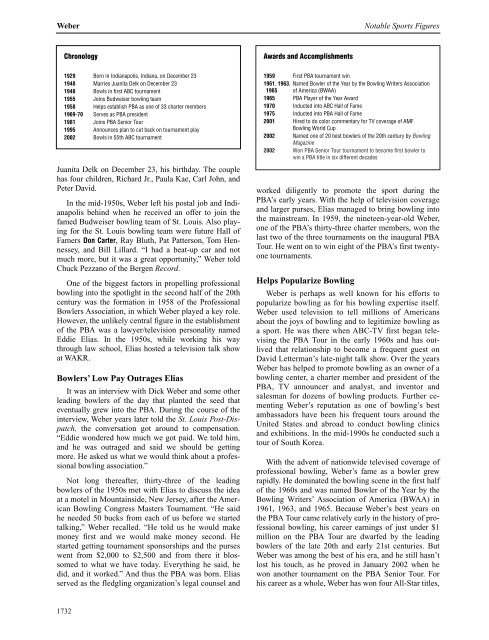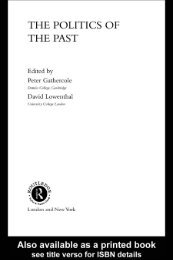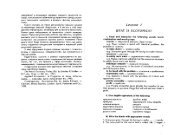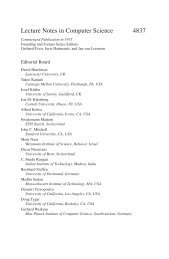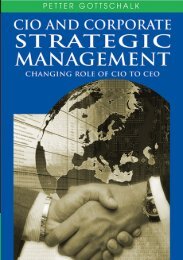Frank Thomas
Frank Thomas
Frank Thomas
Create successful ePaper yourself
Turn your PDF publications into a flip-book with our unique Google optimized e-Paper software.
Weber Notable Sports Figures<br />
Chronology<br />
1929 Born in Indianapolis, Indiana, on December 23<br />
1948 Marries Juanita Delk on December 23<br />
1948 Bowls in first ABC tournament<br />
1955 Joins Budweiser bowling team<br />
1958 Helps establish PBA as one of 33 charter members<br />
1969-70 Serves as PBA president<br />
1981 Joins PBA Senior Tour<br />
1995 Announces plan to cut back on tournament play<br />
2002 Bowls in 55th ABC tournament<br />
Juanita Delk on December 23, his birthday. The couple<br />
has four children, Richard Jr., Paula Kae, Carl John, and<br />
Peter David.<br />
In the mid-1950s, Weber left his postal job and Indianapolis<br />
behind when he received an offer to join the<br />
famed Budweiser bowling team of St. Louis. Also playing<br />
for the St. Louis bowling team were future Hall of<br />
Famers Don Carter, Ray Bluth, Pat Patterson, Tom Hennessey,<br />
and Bill Lillard. “I had a beat-up car and not<br />
much more, but it was a great opportunity,” Weber told<br />
Chuck Pezzano of the Bergen Record.<br />
One of the biggest factors in propelling professional<br />
bowling into the spotlight in the second half of the 20th<br />
century was the formation in 1958 of the Professional<br />
Bowlers Association, in which Weber played a key role.<br />
However, the unlikely central figure in the establishment<br />
of the PBA was a lawyer/television personality named<br />
Eddie Elias. In the 1950s, while working his way<br />
through law school, Elias hosted a television talk show<br />
at WAKR.<br />
Bowlers’ Low Pay Outrages Elias<br />
It was an interview with Dick Weber and some other<br />
leading bowlers of the day that planted the seed that<br />
eventually grew into the PBA. During the course of the<br />
interview, Weber years later told the St. Louis Post-Dispatch,<br />
the conversation got around to compensation.<br />
“Eddie wondered how much we got paid. We told him,<br />
and he was outraged and said we should be getting<br />
more. He asked us what we would think about a professional<br />
bowling association.”<br />
Not long thereafter, thirty-three of the leading<br />
bowlers of the 1950s met with Elias to discuss the idea<br />
at a motel in Mountainside, New Jersey, after the American<br />
Bowling Congress Masters Tournament. “He said<br />
he needed 50 bucks from each of us before we started<br />
talking,” Weber recalled. “He told us he would make<br />
money first and we would make money second. He<br />
started getting tournament sponsorships and the purses<br />
went from $2,000 to $2,500 and from there it blossomed<br />
to what we have today. Everything he said, he<br />
did, and it worked.” And thus the PBA was born. Elias<br />
served as the fledgling organization’s legal counsel and<br />
1732<br />
Awards and Accomplishments<br />
1959 First PBA tournament win<br />
1961, 1963, Named Bowler of the Year by the Bowling Writers Association<br />
1965 of America (BWAA)<br />
1965 PBA Player of the Year Award<br />
1970 Inducted into ABC Hall of Fame<br />
1975 Inducted into PBA Hall of Fame<br />
2001 Hired to do color commentary for TV coverage of AMF<br />
Bowling World Cup<br />
2002 Named one of 20 best bowlers of the 20th century by Bowling<br />
Magazine<br />
2002 Won PBA Senior Tour tournament to become first bowler to<br />
win a PBA title in six different decades<br />
worked diligently to promote the sport during the<br />
PBA’s early years. With the help of television coverage<br />
and larger purses, Elias managed to bring bowling into<br />
the mainstream. In 1959, the nineteen-year-old Weber,<br />
one of the PBA’s thirty-three charter members, won the<br />
last two of the three tournaments on the inaugural PBA<br />
Tour. He went on to win eight of the PBA’s first twentyone<br />
tournaments.<br />
Helps Popularize Bowling<br />
Weber is perhaps as well known for his efforts to<br />
popularize bowling as for his bowling expertise itself.<br />
Weber used television to tell millions of Americans<br />
about the joys of bowling and to legitimize bowling as<br />
a sport. He was there when ABC-TV first began televising<br />
the PBA Tour in the early 1960s and has outlived<br />
that relationship to become a frequent guest on<br />
David Letterman’s late-night talk show. Over the years<br />
Weber has helped to promote bowling as an owner of a<br />
bowling center, a charter member and president of the<br />
PBA, TV announcer and analyst, and inventor and<br />
salesman for dozens of bowling products. Further cementing<br />
Weber’s reputation as one of bowling’s best<br />
ambassadors have been his frequent tours around the<br />
United States and abroad to conduct bowling clinics<br />
and exhibitions. In the mid-1990s he conducted such a<br />
tour of South Korea.<br />
With the advent of nationwide televised coverage of<br />
professional bowling, Weber’s fame as a bowler grew<br />
rapidly. He dominated the bowling scene in the first half<br />
of the 1960s and was named Bowler of the Year by the<br />
Bowling Writers’ Association of America (BWAA) in<br />
1961, 1963, and 1965. Because Weber’s best years on<br />
the PBA Tour came relatively early in the history of professional<br />
bowling, his career earnings of just under $1<br />
million on the PBA Tour are dwarfed by the leading<br />
bowlers of the late 20th and early 21st centuries. But<br />
Weber was among the best of his era, and he still hasn’t<br />
lost his touch, as he proved in January 2002 when he<br />
won another tournament on the PBA Senior Tour. For<br />
his career as a whole, Weber has won four All-Star titles,


